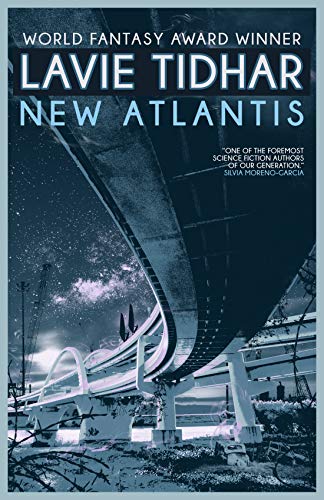Lavie Tidhar’s work always presents itself as mysterious. His work always contains a deceptively simple style, but complications lie beneath the surface. His latest novella, New Atlantis, sends a chronicler named Mai on a journey across Europe and the Middle East in a future where the earth has radically changed, as has humankind’s relationship with technology.
The brisk, in media res nature of the work sets up a new world quickly and effectively. Mai provides little time to question her environment before she receives a holographic message from college buddy Gawain, from “New Atlantis,” or as he calls it, Britannia. Mai and her brother Mowgai begin a journey from their home to Tyr across the ocean, along the shores of Francia, to the flooded islands of Britannia.
But names, though they may sound familiar, aren’t the most memorable part of the journey. Even in the future, the geography around what used to be the Mediterranean seems familiar, but it has changed radically. There’s a rainforest where Paris used to be. A cranky old robot named Bill lives there. Bill claims that humans ruin everything but serves Mai as a guide through the wilderness nonetheless. Eventually, in New Atlantis, Mai connects to a computer that uploads her consciousness to the Internet and discovers that mankind used to be widespread, but overstepped their boundaries.
However, inside the computer, Mai finds celestial bliss. She’s far from the only science fiction hero to do so in recent literary memory. From Tidhar, to Ken Liu to Cory Doctorow, just to name the ones I’ve read recently, a future where we upload our brains to computers is starting to be our generation’s flying cars. Everyone thought we would have flying cars. Maybe, like flying cars symbolizing widespread wealth, the digital afterlife is a sort of generational fantasy. Then again, maybe it’s a kind of Sisyphean torture. As Mai explores the human past, she realizes that the computer can never escape the earth that it came from. After all, we are ending a novella about a world pretty much ruined by humans.
A fantastic and surprisingly thought-provoking journey. As much as it bears resemblance to contemporary sci-fi, it adds to the conversation instead of parroting it. Well worth the read, though only available on e-book as of this writing.
Three stars out of five
Favorite quote: “That every existence is a solitary one, that we are each of us a simulation, and how do we trust anything we see, or feel?

Photo courtesy of Amazon.com




